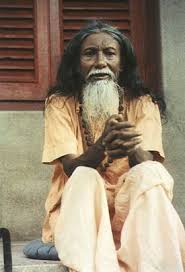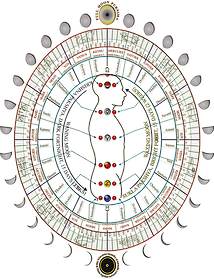 In India the spiritual master (guru) holds a very important position. Spirituality can only be understood properly in a master-disciple relationship. In the Indian monastic tradition, the disciple is expected to serve his master all his life. Through such service he receives the teachings of his guru, both theoretical and practical, while at the same time acquiring his guru’s qualities.
In India the spiritual master (guru) holds a very important position. Spirituality can only be understood properly in a master-disciple relationship. In the Indian monastic tradition, the disciple is expected to serve his master all his life. Through such service he receives the teachings of his guru, both theoretical and practical, while at the same time acquiring his guru’s qualities.
The scriptures say “The disciple obtains knowledge from his master through humble service and by asking him judicious questions in a considerate manner.”
Of all the different ways to receive knowledge, service to the master is considered to be the best whilst at the same time the most difficult. This was the path that Swami Narayana Giri (Prabhujee) followed. He extended his service to Sri Yukteswarjee for around twenty years, until the mahasamadhi (the last breath) of his master.
Swami Narayana Giri never tried to take advantage of his privileged position beside his guru. A disciple usually expects to eventually become a master himself, but he used to say:” I will always be happy to be your disciple and to serve you; I have no desire to become a master and to move away from you.”
Even after mahasamadhi of Sri Yukteswarjee, he did not want to initiate anybody. Only when a seeker who had an earnest desire to know Kriya Yoga came to him with repeated requests, was he willing to consider and initiate. Because of this, he only had about ten disciples during his entire life. He used to say that one proper disciple is better than initiating thousands of them. He used a common saying in Bengali:”Guru mile lakh, sisya mile ek”, which means that hundreds of thousands of masters are available but that one proper disciple is very rare.
Sri Yukteswarjee was very strict and it was difficult for many disciples to remain with him for a long time. Swami Narayana was the only one to accept the strict discipline unfailingly and to stay with him up until the very end.
Sri Yukteswarjee was one of the greatest masters ever to incarnate. His correct understanding and teaching of spirituality, morally and scientifically is incomparable to anyone else. He was not merely a strict master – he maintained the correct technique that he had learned from his master Lahiri Mahasaya.
Due to his very exacting nature, e.g. waking up on time, meditating on time, initiating on specific days and precision in everyday matters no disciple could stay with him for more than a few days. Often they came, learned, stayed a while and then departed.
As long as he had the capacity to manage and maintain the ashram (hermitage) by himself, Sri Yukteswarjee was never dependant on anybody. He personally looked after even the simplest things, such as cooking. When he became old, he was unable to manage some of the duties, in particular the kitchen. Sometimes there was no one suitable to cook and serve him food. At such times, and if there were visitors or visiting disciples, Sri Yukteswarjee would send someone to Sri Jagannath temple to buy mahaprasad.
The rest of the time, however, Sri Yukteswarjee ate dried chapatti with milk. He used to make them with the help of other people once a month and then they would be stored and used during the month. Fortunately, whenever Prabhujee was at the ashram, proper food was cooked and served on time and in the way the guru preferred. At such times the ashram food was delicious and healthy, for instance, kichidi, the same type of food also prepared in the Yogoda ashram founded by Paramahansa Yogananda in Ranchi, Bihar, India and in many other Kriya Yoga ashrams, would be served every day.
Gradually during the years spent with his master, Swami Narayana became indispensable to Sri Yukteswarjee. Swami Narayana was totally devoted and considerate towards him and tried to provide his master with as much comfort as possible. Since Prabhujee served him food everyday Sri Yukteswarjee used to call him and say: “Prabhu, give me food”, which means, “My Lord, give me food”. Consequently, everyone started to use the name “Prabhujee” when referring to Swami Narayana Giri.
Prabhujee was born into the Pradhan family at Naugaon village, in West Bengal’s Sabang district. During his childhood his name was Kenaram. He had two maternal uncles, Isvar Chandra Maiti and Saresvar Maiti. Both married and lived at Bhkishindipur village, Poat-Khelna, in West Bengal. Saresvar Maiti and his wife were childless and he died at the early age of forty. Isvar Maiti had a second sister named Allhadi, who was also married and lived in Naugaon. She too had no children and became a widow just a few years after her marriage. Later she came to Bhishindipur and stayed there with her brothers. We have no information about the parents of Kenaram (Prabhujee)
Normally in India no one enquires about the past life of a monk. One can ask about many other things but it is not considered polite or relevant to ask about a monk’s parentage. This is the reason why we lack knowledge about his parents. However, one can surmise that since he was staying with his uncle and aunt, he had probably lost his parents at a young age.
At the age of six or seven Kenaram came to live with his uncle in Bhishindipur to continue his studies. At the age of seven or eight, Kenaram went to the Ganga Sagar Mela (festival) with his aunt Allhadi. At the time the Ganga Sagar Mela was a very famous place of pilgrimage. While enjoying the mela, Kenaram got lost from his aunt. As he recalled this event later, Prabhujee sait that someone took him to Sri Yukteswarjee’s camp which was situated near to the ashram of Kapil Muni. Kenaram was crying all the time and to calm him down Sri Yukteswarjee gave him some coconut ladu (a sweet) and asked for his name and with whom he had come to the mela. Then Sri Yukteswarjee asked one of his disciples to go to the information centre and announce their names by the hand-held megaphone. Allhadi heard the announcement and, overcome with joy she rushed to the camp to collect Kenaram. She was so excited that she even forgot to thank to Sri Yukteswarjee for helping her.
On the way home, Kenaram anxiously asked his aunt many questions about the pious saint and she spontaneously spoke out:” O, My God! What have I done! I forgot to thank him.” She answered Kenaram’s questions about Sri Yukteswarjee and told him all that she knew about the great saint – including the fact that Sri Yukteswarjee was the most prominent Kriya master in all Bengal and that he attended the Ganga Sagar Mela each year.
After Kenaram returned home, he could not forget the moments that he had spent together with Sri Yukteswarjee at his camp. At home, Kenaram was often forced to do a lot of work for his uncle who used to beat him ruthlessly. He wanted to leave the house and often said to his aunt, “You lost me and he (Sri Yukteswarjee) found me; therefore, I am now his property. It is very difficult for me to stay at home any longer.” He would often ask his aunt to take him to Sri Yukteswarjee’s ashram.
Trying to fulfill Kenaram’s wishes, one day Allhadi introduced him to her neighbor Srinivas Hajra, who was a disciple of Sri Yukteswarjee. Srinivas Harja said that he was going to attend a Kriya Yoga congress held by Sri Yukteswarjee in Durgapur. Kenaram expressed his wish to accompany Srinivas, to see Sri Yukteswarjee and to listen to his speech, but Srinivas told him that he was too young to understand. However after Kenaram’s repeated requests, Srinivas agreed to take him to Durgapur. This time he only saw Sri Yukteswarjee from a distance. He did not try to get closer to him; because he did not want anyone to see that he had a deep interest in this great man and his ashram. He knew that one day he would leave his home to live with the great master.
Meanwhile he found out the address of the Srirampur ashram and when Kenaram was just twelve or thirteen years old, he left his home and went directly to the ashram at Srirampur near Howrah. Masima (aunty) Allhadi knew that it was inevitable that one day Kenaram would go to find Sri Yukteswarjee. Therefore, neither Masima, nor any other member of the family went searching for him. After a few days Masima went to Srirampur to give her nephew her blessings and to wish him success on his divine path.
After listening attentively to Sri Yukteswarjee, Kenaram devoted himself to his master and served him from then on. His master initiated Kenaram into Kriya Yoga at this very young age. Kenaram first stayed with his master at Srirampur for about two years. Then they went to Karar Ashram in Puri where he stayed with Sri Yukteswarjee till his mahasamadhi in 1936. After Kenaram had taken sanyas, Sri Yukteswarjee bestowed upon him the name of Swami Narayana Giri.








 In India the spiritual master (guru) holds a very important position. Spirituality can only be understood properly in a master-disciple relationship. In the Indian monastic tradition, the disciple is expected to serve his master all his life. Through such service he receives the teachings of his guru, both theoretical and practical, while at the same time acquiring his guru’s qualities.
In India the spiritual master (guru) holds a very important position. Spirituality can only be understood properly in a master-disciple relationship. In the Indian monastic tradition, the disciple is expected to serve his master all his life. Through such service he receives the teachings of his guru, both theoretical and practical, while at the same time acquiring his guru’s qualities.